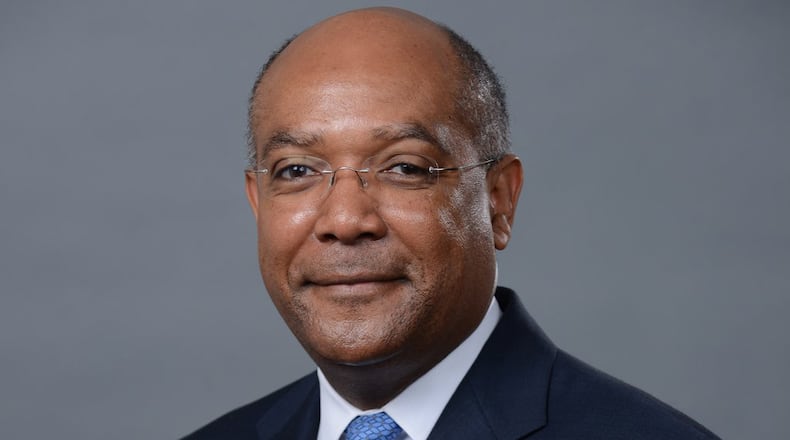Atlanta’s city retirement plans sunk tens of millions of dollars into improper investments when they were misled by Buckhead investment adviser Larry Gray, a federal agency found in late 2017.
Yet today, all three of the city’s pension plans still have their money in the controversial investment pool, now run by another Buckhead consultant. And the investments have, so far, proven lackluster, carrying high fees and returning an average of only about 3.7 percent a year since 2013.
“It’s just a huge under-performance,” said Edmund J. Wall, a managing director of public finance investment banking at investment firm Piper Jaffray.
What’s more, the investment pool still may not comply with Georgia law, raising questions about why the government pension plans haven’t backed out, said Wall and other finance experts who reviewed the GrayCo Alternative Partners II LP pool at the request of The Atlanta Journal-Constitution.
Gray intentionally defrauded the pensions when he told them the investment pool he ran complied with state law, the Securities and Exchange Commission found. While the pension plans' contracts locked in the investments for a minimum of 10 years, the SEC's findings would have voided the contracts, experts say.
The complex situation has pushed the retirement systems into a bit of a corner, the AJC found: It may appear to be almost impossible to unwind the deal, even costlier to try.
Meanwhile, the company that bought the pool from Gray is being paid handsomely to keep it going. Consequent Capital Management now is paid the hundreds of thousands of dollars a year in management fees that are part of the agreements the pension plans signed. The fees, spread over the 10-year period that expires in 2022, will total millions.
John Robinson, CEO of Consequent, did not respond to requests for an interview. Gray could not be reached for comment.
Some former and current pension leaders told the AJC that they wanted to withdraw from the pool but were advised by legal experts to stay put. The costs associated with a withdrawal, they were told, would harm the plans.
Atlanta Councilman Howard Shook said it was viewed as risky to try to terminate the contracts. Shook oversees the city’s finance committee, which makes recommendations to the pension boards.
“The issue with ‘firing’ the firm is the exposure of the city to breach of contract and potential legal action taken by the firm and investors,’’ Shook wrote in a response to questions from the AJC.
State, federal violations
Gray was serving as the pension plans’ investment adviser in 2012 when he began his investment pool. Shortly after starting it, Gray persuaded the Atlanta General Employees’ Pension Plan, the Police Officers’ Pension Plan and the Atlanta Firefighters’ Pension Plan to invest.
It was the first year Georgia public pension systems were allowed to invest in alternatives, such as private equity, hedge funds, real estate and distressed businesses. But the law authorizing the investments carried certain restrictions meant to curb risks and discourage politically connected arrangements.
The law limits any one pension from holding more than a 20% stake in an alternative fund. It also requires that an alternative fund have at least four other investors and at least $100 million in assets before a government pension fund could buy in.
Gray’s fund of funds violated all three state requirements, the SEC said in a 2015 complaint. He then violated federal law by making two specific material misrepresentations about the investment pool to the board of the general employees’ plan, the agency said.
"Once you give these funds money, you can't get it in 10 years. It's a mess trying to get it undone." —Edmund J. Wall, chairman of the DeKalb County Employees Retirement Plan
Gray claimed that the alternative investment “was consistent with the law.” He also told the board members that four other pension plans already were invested when the deals had not been executed. Three of those, in New York, Chicago and Michigan, never invested in the plan, the SEC complaint said, and the other had not yet invested.
Today, despite the combined $64.5 million investment by the three city retirement plans, the investment pool still apparently does not meet the state criteria, experts said. The SEC’s 2017 order showed the fund had not yet reached the $100 million requirement and that two of the city pension plans had more than 20 percent stakes.
“State law says it has to be $100 million for any of us to invest in,’’ said Wall, who is also the chairman of the DeKalb County Employees Retirement Plan. “So, Atlanta may be violating state law by investing pension money in a fund that doesn’t have $100 million.”
Cannon Carr, chief investment officer at CornerCap Investment Counsel in Atlanta, said that points to lax oversight.
At a minimum, the pension systems should have taken steps to comply with state law after the SEC’s findings were made public, he said. “Whatever the particulars, there should be someone who should be looking at those state parameters to make sure the fund is in compliance,’’ Carr said. “It’s pretty straightforward.”
Falling through the cracks
But it can be a tricky business to get out of alternative investments.
The investments are loosely regulated, provide little transparency and can fall into areas that investors know little about. Often, their underlying assets can be hard to value and even more difficult to dump.
That’s why many pension leaders avoid them in the first place.
Wall said he doesn’t think Georgia public pensions should even be allowed to invest in these types of funds. “It’s so expensive, the fees are so very high and they’re very illiquid,” Wall said. “Once you give these funds money, you can’t get it in 10 years. It’s a mess trying to get it undone.”
Because of the complexity and high risk, a higher level of due diligence is demanded by those that do invest, the experts said.
“If you’re not up to the game, you just shouldn’t be investing in alternatives,” Carr said.
Atlanta may not have been up to the task. One month after the SEC suspended Gray, two of the three pension boards sued the city over an ordinance that replaced their pension leaders with a new governance board. The pension plans lost the suit, then it took several months for the new board to elect leaders.
It wasn’t until September that the new board had a fully-seated quorum. Two months later, the new board received its first update on the progress of investments.
The new board is still in the middle of evaluating a new consultant to oversee investments.
------------------
Gray’s role in question
Atlanta Journal-Constitution investigations in 2013 led to investment adviser Larry Gray resigning from his role as consultant to three Atlanta pension boards. In resigning, he cited media coverage raising questions about his firm's dual roles advising the pensions on investments and touting investments in his own fund.
In 2015, the Securities and Exchange Commission filed a complaint against Gray, accusing him of misleading the pensions about the fund he created.
But his firm still managed the fund, GrayCo Alternative Partners II, through sometime in 2016.
Then, in a June 2016 letter to the pension boards, Gray said that his firm would become part of a newly created company, Consequent Capital Management. Gray wrote that he was a minority owner of the new company, but once the transaction was completed, the GrayCo fund would be managed by Consequent’s senior management team, not by anyone from Gray’s firm.
“Mr. Gray will not have rights to control Consequent related to this ownership interest,” the letter said.In early 2017, Consequent said it had acquired the assets of Gray Financial.
Then in November 2017, the federal Securities and Exchange Commission suspended Gray and his firm from associating with any broker-dealer, investment advisor or credit rating agency for two years. He will have to reapply to SEC before he can be reinstated.
It’s unclear if Gray still has an ownership interest in Consequent. Neither the company nor Gray could be reached for comment.
But he no longer has a role with the GrayCo fund, said Richard “Bud” Light, a former member of the Police Officers’ Pension Fund now a member on the City of Atlanta Pension Investment Board, which was established last year to oversee investments for police, firefighters and general employees. The firefighters plan now lists the fund as Consequent Alternative Partners II, L.P.
“He doesn’t have anything to do with the investment, nor is he allowed to,’’ Light said.
The SEC's 2017 order also requires Gray and his firm to pay $476,298 in fines and disgorgement to harmed investors. Last month, the SEC said it needed more time to work out a plan to distribute the money to the investors.
-----------------
Why it matters
The city of Atlanta’s pension plans are short hundreds of millions of dollars needed to pay retirement obligations. The plans rely heavily on the performance of their investments to reduce the shortfalls, so the burden won’t fall on taxpayers. According to reports the three pension plans submitted to the state auditor, investments are expected to earn average annual returns of 7.25 to 7.5 percent. An alternative investment fund so far has averaged about 3.7 percent.
About the Author
Keep Reading
The Latest
Featured





